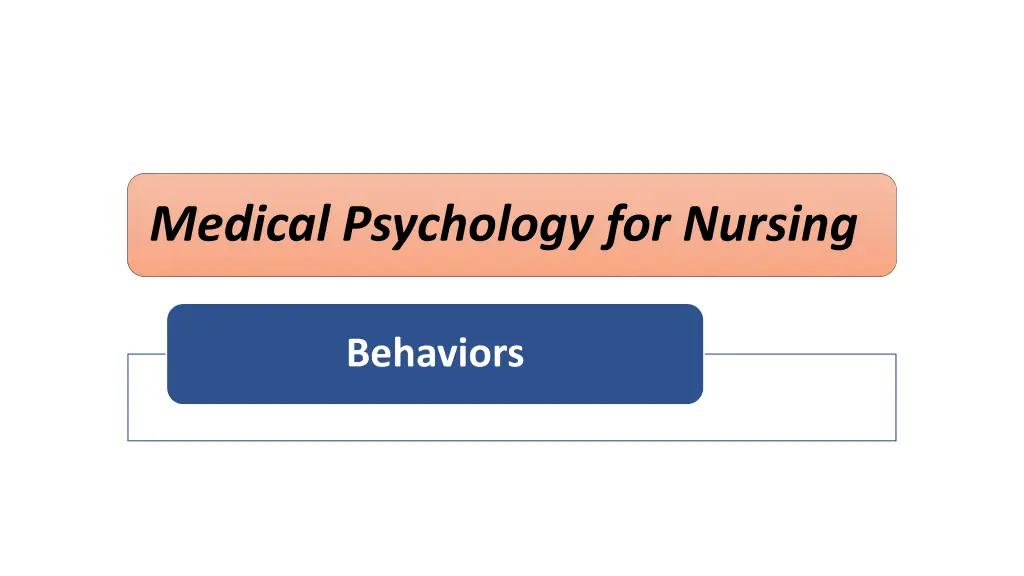
Understanding Health Behaviors and Their Impact on Well-being
Explore the concept of health behaviors, distinguishing between normal and abnormal characteristics, social behaviors, and anti-social behaviors. Learn how behaviors can impact health, disease prevention, and community well-being.
Download Presentation

Please find below an Image/Link to download the presentation.
The content on the website is provided AS IS for your information and personal use only. It may not be sold, licensed, or shared on other websites without obtaining consent from the author. If you encounter any issues during the download, it is possible that the publisher has removed the file from their server.
You are allowed to download the files provided on this website for personal or commercial use, subject to the condition that they are used lawfully. All files are the property of their respective owners.
The content on the website is provided AS IS for your information and personal use only. It may not be sold, licensed, or shared on other websites without obtaining consent from the author.
E N D
Presentation Transcript
Medical Psychology for Nursing Behaviors
Objectives At the end of this lecture, students will identify: Health behaviors. Types of health behaviors.
Behavior: It is the actions or reactions of a person or animal in response to external or internal stimuli.
Characteristics behavior of abnormal Characteristics ofnormal behavior A perception of realty Change in persons thinking process, perception and judgment. Positive attitude towards one s self- acceptance of weakness and pride in strengths. work efficiency well be reduced forgetfulness Capacity for with standing anxiety and stress unhappiness Adequate in work and play. unable to cope Willingness to use problem solving approaches in live process.. lack of self confidence Feeling of stress and anxiety
Health behaviours: Are defined as any activity undertaken for the purpose of preventing or detecting disease or for improving health and well-being. In addition, health behaviours defined as behaviour patterns, actions and habits that relate to health maintenance, to health restoration and to health improvement. Such behaviours include exercise, fruit and vegetable consumption, and condom use in response to the threat of sexually transmitted diseases.
Health impairing behaviours: are the behaviors that have harmful effects on health or otherwise predispose individuals to disease. Such behaviors include smoking, excessive alcohol consumption, and high dietary fat consumption
Social behaviour: Behavior can be social in nature (for the good of the community) or anti-social in nature (unacceptable to the community), as in the manner of conducting oneself according to social norms (or not).
Anti-social behaviour Anti-social behavior is behavior that is unacceptable to other people (the community), behavior that violates another person s right. Such behavior violates the rights of others and may therefore be defined as violence.
Non-Assertive Behavior is that type of interpersonal behavior, which enables the person s rights to be violated by another. A non-assertive person inhibits her/his honest, spontaneous reactions and typically feels hurt, anxious and sometimes angry as a result of being non-assertive in a situation.
Assertive Behavior is that type of interpersonal behavior in which a person stands up for their legitimate rights in such a way that the rights of others are not violated. It communicates respect for that person s behavior. Assertive behavior is an honest, direct and appropriate expression of one s feelings, beliefs, and opinions.
Emotional behavior There are situations where a person or animal may respond emotionally with anger, fear, joy, excitement. Love and hate are emotions, but they do not seem to be distinct reactions, as are with the other emotions. The way a person or animal emotionally responds or reacts to a stimulus determines his or her emotional behavior.
Uncontrolled behavior: There are situations where a person or animal may respond in a manner that is uncontrolled. Often this is related to emotional behavior, but it also may be due to addictions of some sort. For example, while everyone may get angry, there are some who easily lose their temper and even go into an uncontrolled rage.
Group behavior There are situations where a group of people or animals act as an entity itself or may result in anti-social or uncontrolled behavior by the individuals in the group. Sometimes this is called the "mob mentality."
Several types of health behaviors: 3. Exercise: The potential health benefits of engaging in regular exercise include reduced cardiovascular morbidity and mortality, lowered blood pressure, and the increased metabolism of carbohydrates and fats, as well as a range of psychological benefits such as improved self-esteem, positive mood states, reduced life stress and anxiety 1. Smoking: is the health behavior most closely linked with long-term negative health outcomes. 2. Diet: The impact of diet upon morbidity and mortality are well established. Diet has been implicated in cardiovascular diseases (CVDs), strokes and high blood pressure, cancer, diabetes, obesity, osteoporosis, and dental disease.
Several types of health behaviours: 4. Health Screening: Individuals may seek to protect their health by participating in various screening programs which attempt to detect disease at an early, or asymptomatic, stage. 5. Alcohol Use: Moderate alcohol consumption has been linked to positive health outcomes. However, high alcohol consumption has been linked to a range of negative health outcomes including high blood pressure, heart disease and cirrhosis of the liver. High levels of alcohol consumption have also been associated with accidents, injuries, suicides, crime, domestic violence, rape, murder and unsafe sex.






















